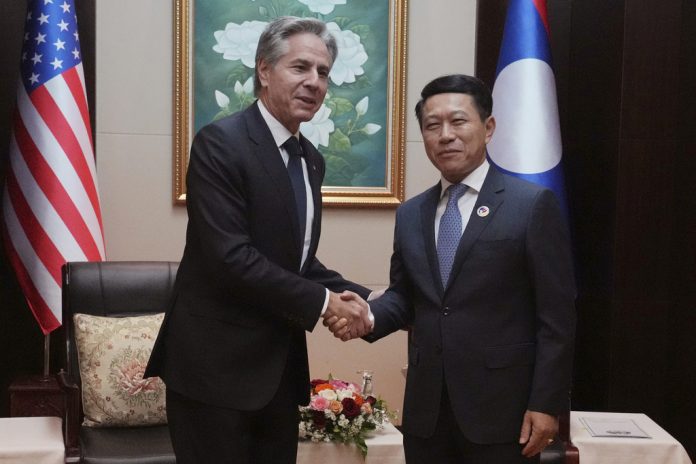VIENTIANE, Laos (AP) — Top diplomats from Southeast Asia convened Saturday in the Laotian capital with their powerful dialogue partners in the last of the three-day regional talks that have grappled with tensions over territorial claims in the South China Sea, escalating fighting in Myanmar, and regional rivalry.
Meetings on Saturday will bring together in the same room allies of the Association of Southeast Asian Nations — including the United States, China, Russia, Japan, India and Australia — to bolster their relationships and discuss key security issues and other regional affairs.
U.S. Secretary of State Antony Blinken arrived Saturday in Vientiane to meet with the ASEAN foreign ministers. He is also expected to meet on the sidelines with his Chinese counterpart, Wang Yi, as both countries are looking to expand their influence in the region.
Lao Foreign Minister Saleumxay Kommasith opened the first meeting of the day with China, Japan and South Korea by saying he hopes the partners will continue to “enhance our regional integration and economic resilience, ensuring that our supply chains remain robust and adaptable in the face of future challenges.”
Japanese Foreign Minister Yoko Kamikawa said the cooperation between the partners has diversified beyond just financial cooperation, emphasizing also the importance of stability, peace and security. China’s Wang highlighted the economic and trade ties, expressing China’s willingness to strengthen cooperation on these matters.
Russian Foreign Minister Sergey Lavrov was also in Vientiane, and already held direct talks with Wang on Thursday.
Participants in these meetings represent either critical U.S. allies and partners, or Washington’s two largest rivals, Moscow and Beijing, which have grown closer over the past two years, prompting deep concerns about their combined global influence.
Indonesia said it emphasized in their opening meetings Thursday that it’s important the bloc doesn’t get drawn in as both China and the U.S. look to expand their influence in the region.
Among other issues, Blinken would discuss economic cooperation, the humanitarian crisis in Myanmar and territorial disputes in the South China Sea during his trip in Vientiane, according to a statement from the U.S. Department of State.
ASEAN members Vietnam, the Philippines, Malaysia and Brunei all have conflicts with China over its claim of sovereignty over virtually all of the South China Sea, one of the world’s most crucial waterways for shipping. Many worry that direct confrontations there could lead to broader conflict. Indonesia has also expressed concern about what it sees as Beijing’s encroachment on its exclusive economic zone.
There are divisions within ASEAN on how to deal with China’s maritime claims. The Philippines has been critical over a perceived lack of support from the bloc, but in a rare deal, China and the Philippines said they had reached an agreement that they hope will end their confrontations, aiming to establish a mutually acceptable arrangement for the disputed area without conceding each other’s territorial claims.
Philippines Secretary of Foreign Affairs Enrique Manalo said after the gala dinner on Friday that he had a bilateral meeting with China’s Wang, where they agreed that they would “honor the provisional agreement in a clear and sincere effort to defuse tensions and try and prevent any incidents of course from leading to further tension in our relationship.”
On Saturday, the Philippines said it was able make a supply trip to the disputed area without having to confront Beijing’s forces, the first such trip since the deal was reached a week ago.
The United States and its allies have regularly conducted military exercises and patrols in the area to assert their “free and open Indo-Pacific” policy — including the right to navigate in international waters — which has drawn criticism from China.
Wang said in his meeting with Manalo that the deployment of a U.S. intermediate-range missile system in the Philippines would create regional tension and trigger an arms race, according to a statement from the Chinese Foreign Ministry.
The increasingly violent civil war in ASEAN member state Myanmar is one of the other issues dominating talks. Thailand has said the group gave their support for it to take a broader role as one of Myanmar’s immediate neighbors.
Nikorndej Balankura, spokesperson of Thailand’s Ministry of Foreign Affairs, told reporters Friday that more dialogue mechanisms have been proposed to include more stakeholders, especially countries that share borders with Myanmar. He however noted that those proposals have just been submitted to Laos, which currently chairs ASEAN and is in charge of recommending them directly to Myanmar to seek its approval.
The army in Myanmar ousted the elected government of Aung San Suu Kyi in February 2021 and suppressed widespread nonviolent protests that sought a return to democratic rule, leading to increasing violence and a humanitarian crisis.
ASEAN has been pushing a “five-point consensus” for peace, but the military leadership in Myanmar has so far ignored the plan, raising questions about the bloc’s efficiency and credibility. The peace plan calls for the immediate cessation of violence in Myanmar, a dialogue among all concerned parties, mediation by an ASEAN special envoy, provision of humanitarian aid through ASEAN channels, and a visit to Myanmar by the special envoy to meet all concerned parties.
___
Associated Press journalist Ken Moritsugu in Beijing contributed to this report.
Source: post





